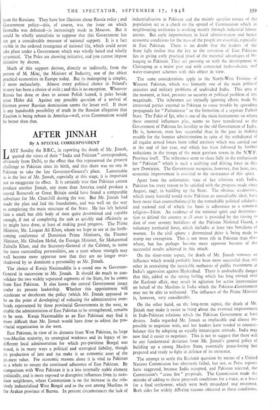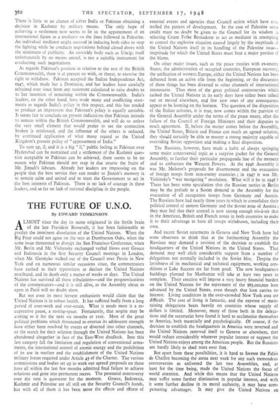AFTER JINNAH
By A SPECIAL CORRESPONDENT
LAST Sunday the B.B.C., in reporting the death of Mr. Jinnah, quoted the views of their "India and Pakistan" correspondent, obviously from Delhi, to the effect that this represented the greatest challenge to Pakistan since its birth, and that there was no one in Pakistan to take the late Governor-General's place. Lamentable as is the loss of Mr. Jinnah, especially at this stage, it is important not to exaggerate its effect. It is certainly true that Pakistan cannot produce another Jinnah, any more than America could produce a second Roosevelt or Great Britain could have found a comparable substitute for Mr. Churchill during the war. But Mr. Jinnah had made the plan and laid the foundations, and was well on the way to completing the main structure of the State.. He has left behind him a small but able body of men quite determined and capable enough, if not of completing the task as quickly and efficiently as he might have done, at least of making good progress. The Prime Minister, Mr. Liaquat Ali Khan, whom we hope to see at the forth- coming conference of Dominion Prime Ministers, the Finance Minister, Mr. Ghulam Mohd, the Foreign Minister, Sir Mohammed Zafrulla Khan, and the Secretary-General of the Cabinet, to name the more outstanding personalities, are a team whose strength may well become more apparent now that they are no longer over- shadowed by so dominant a personality as Mr. Jinnah.
The choice of Kwaja Nazimuddin is a sound one as Governor- General in succession to Mr. Jinnah. It should do much to con- solidate the two widely separated segments of the State, for he comes from East Pakistan. It also leaves the central Government intact under its present leadership. Whether this appointment will accelerate or decelerate the policy (which Mr. Jinnah appeared to be on the point of developing) of reducing the administrative over- heads represented by three provincial Governments in the west, to enable the administration of East Pakistan to be strengthened, remains to be seen. Kwaja Nazimuddin as an East Pakistani may find it more difficult than Mr. Jinnah would have done to adjust the pro- vincial organisation in the west.
East Pakistan, in view of its distance from West Pakistan, its large non-Muslim majority, its strategical weakness and its legacy of in- different local administration for which pre-partition Bengal was noted, is in many ways a political and strategical liability, though its production of jute and tea make it an economic asset of the gr...atest value. For economic reasons alone it is vital to Pakistan as a whole to ensure the continued adherence of East Pakistan. By comparison with West Pakistan it is a less internally stable element politically, and is more exposed to disruptive influences fiom its next- door neighbours, where Communism is on the increase in the rela- tively industrialised West Bengal and to the east among Muslims in the Arakan province of Burma. In present circumstances the lack of
industrialisation in Pakistan and the mainly agrarian nature of the population act as a check on the spread of Communism which in neighbouring territories is working mainly through industrial labour unions. But early improvement in local administration and better economic conditions for the mass of the people are essential, especially in East Pakistan. There is no doubt that the leaders of the State ftdly realise that the key to the retention of East Pakistan lies in giving early practical proof of the material advantages of be- longing to Pakistan. They are pressing on with the development 01 Chittagong as a major port and with connected hydro-ekctric and water-transport schemes with this object in view.
The same considerations apply to the North-West Frontier of Western Pakistan, which was formerly one of the main political anxieties and military problems of undivided India. This area at the moment, at least, presents no security or political problem of any magnitude. The tribesmen are virtually ignoring efforts made by interested parties external to Pakistan to cause trouble by spreading propaganda for " Pathanistan " or the formation of a separate Pathan State. The Fakir of Ipi, who is one of the main instruments on whom these external influences play, seems to have transferred to the Government of Pakistan his hostility to the old Government of India. He is, however, even less successful than in the past in making trouble for the frontier administration in spite of the withdrawal of all regular armed forces from tribal territory which was carried out at the end of last year, and which has been followed by further reductions in the troops of the main garrison towns in the N.W.F. Province itself. The tribesmen seem to share fully in the enthusiasm for "Pakistan" which is such a unifying and driving force in this new Dominion. The Government recognise, however, that here, too, economic improvement is essential to the sustenance of this spirit.
Apart from the unfortunate state of her relations with India, Pakistan has every reason to be satisfied with the progress made since August, 1947, in building up the State. The obvious weaknesses, which many foretold would make Pakistan an unrealisable ideal, have been more than counterbalanced by the remarkable political solidarity and national zeal of which the basis is adherence to a common religion—Islam. An evidence of the national spirit and determina- tion to defend the country at all costs is provided by the raising to date of over seventy battalions of the Pakistan National Guard, a voluntary territorial force, which includes at least two battalions of .women. In the civil sphere a determined drive is being made to stamp out corruption. This is not more rife in Pakistan than else- where, but has perhaps become, more apparent because of the successful results achieved in this attack.
On the short-term aspect, the death of Mr. Jinnah removes an influence which would probably have been more successful than any other in restraining the inevitable outbursts of public resentment at India's aggression against Hyderabad. There is undoubtedly danger that this, added to the strong feeling which has long existed over the Kashmir affair, may result in agitation for active intervention on behalf of the Muslims in India which the Pakistan .Government may not be able to withstand. The influence of the Prime Minister is, however, very considerable.
On the other hand, on the long-term aspect, the death of Mr. Jinnah may make it easier to bring about the eventual improvement in Indo-Pakistan relations which the Pakistan Government at least desires. India regarded Mr. Jinnah as implacable and almost im- possible to negotiate with, and her leaders have tended to counter- balance this by adopting an equally intransigent attitude. India may now find it easier to negotiate. This is not to suggest that there will be any fundamental deviation from Mr. Jinnah's general policy of building up a strong Moslem State, essentially peace-loving but prepared and ready to fight in defence of its existence.
The attempt to settle the Kashmir question by means of a United Nations Commission has obviously- failed, but not, as Press reports have suggested, because India accepted, and Pakistan rejected, the Commission's "cease fire" proposals. The Commission made the mistake of adding to these proposals conditions for a truce, as a basia for a final settlement, which were both misjudged and mistimed. Both sides for widely differing reasons objected to these conditions. There is little or no chance of either India or Pakistan obtaining a decision in Kashmir by military means. The only hope of achieving a settlement now seems to lie in the appointment of an international figure as a mediator on the lines followed in Palestine. An individual mediator might succeed in inducing both sides to stop the fighting while he conducts negotiations behind closed doors with the minimum of publicity. An unwieldy body such as Uncip, itself unfortunately by no means united, is not a suitable instrument for conducting such negotiations.
As regards Pakistan's position in relation to the rest of the British Commonwealth, there is at present no wish, or threat, to exercise the right to withdraw. Pakistan accepted the Indian Independence Act, 1947, which made her a Dominion, and her leaders have carefully refrained ever since from any statement calculated to raise doubts to her intention of remaining within the Commonwealth. India's leaders, on the other hand, have made many and conflicting state- ments as regards India's policy in this respect, and this has tended to produce an impression that Pakistan's policy is equally unstable. It seems fair to conclude on present indications that Pakistan intends to remain within the British Commonwealth, and will do so unless the very small element that would prefer to see the connection broken is reinforced, and the influence of the others is reduced, by continued application of what many regard as the United Kingdom's present policy of "appeasement of India."
To sum up, if, and it is a big "if," public feeling in Pakistan over Hyderabad can be restrained and a settlement of the Kashmir ques- tion acceptable to Pakistan can be achieved, there seems to be no reason why Pakistan should not reap in due course the fruits of Mr. Jinnah's labours. Already her leaders are impressing on the people that the best service they can render to Jinnah's memory is to remain calm and united and to trust the Government to act in the best interests of Pakistan. There is no lack of courage in these leaders, and so far no lack of national discipline in the people.



































 Previous page
Previous page